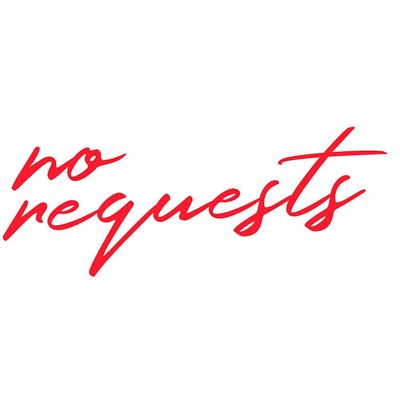
About this Event
Welcome to the House Music DJ Class for beginners in Portland.
In this DJ class you will learn the fundamentals of DJing and the craft of house music mixing with hands on practice. This course will give you the fundamental abilities and information need to begin in the world of house music DJing, whether you are a total beginner or have some prior experience.
During the DJ class, you will learn:
- The fundamentals of DJing, including equipment setup, beatmatching, and mixing techniques.
- How to organize your music library, including the importance of BPM, key, and genre.
- The different sub-genres of house music, such as deep house, tech house, and progressive house, and how to mix each style.
- How to read and work with a crowd, including the importance of track selection and energy management.
You don't need to bring anything.
About No Requests
In 2021, a group of friends were out late one night in Portland, looking for a place to listen and dance to amazing house music artists and DJs.We weren’t just looking for any club. We were looking for a house music oasis. A place that consistently embodies the club culture we grew up with, where house and electronic music is enjoyed by everyone, without intolerance or judgement. But… we couldn’t find it in the way we wanted.
We were an eclectic mix. Passionate house music DJs influenced by the European club culture, event curators and long time DJs from Portland, and transplants from all over the world who now call Portland home.
One day, we came together to create a new concept based on our experiences and our love of house music. As an eclectic bunch of music lovers, we know that diversity has always been at the heart of club culture and house music. Celebrating and respecting everyone regardless of religion, race, physical ability, nationality, ethnicity, sexual orientation, or gender identity is the foundation of club culture.
After months of creative planning, we decided to contribute to the house music scene in Portland in a very special way and open a club called No Requests. At No Requests, we follow a radically open dance floor and door policy. We ensure that all of our house music events embody the club culture that we love, believe in, and want to foster, while keeping our guests as safe as possible during this time of ambiguity.
Our commitment is to consistently showcase the best Portland-based house music DJs as well as regional (Oregon), national, and international house music DJs, while celebrating diversity and equality, and constantly innovating the experiences and services at No Requests.
And by doing so, Portland's club culture and house music scene will be globally recognized as one of the top destinations for house and electronic music.
No Requests, and no regrets.
House Music Guide: A Brief History of House Music
WHAT IS HOUSE MUSIC?
House Music is a genre of electronic dance music which is characterized by a four to the floor beat. The beats per minute or BPM is around 120 to 130. House Music was created by house music djs and house music producers from the Chicago underground club culture in the early 1980s. It really started with disco where djs from the altered disco tracks to give them a more mechanical, richer and deeper basslines.
A BRIEF HISTORY OF HOUSE MUSIC
The genre was pioneered by DJs and producers mainly from Chicago and New York such as Frankie Knuckles, Larry Levan, Ron Hardy, Jesse Saunders, Chip E., Steve "Silk" Hurley, Farley "Jackmaster" Funk, Mr. Fingers, Marshall Jefferson, Phuture, and many others. Its origins derive from within the Black American LGBT communities but has since spread to the mainstream. From its beginnings in the Chicago club and local radio scene, the genre expanded internationally, then to other American cities and has become a worldwide phenomenon ever since. There are numerous subgenres, such as acid house, deep house, progressive house, tech house, electro house, hip house ghetto house, organize house music and many more.
House music is characterized by repetitive 4/4 rhythms including bass drums, off-beat hi-hats, snare drums and/or claps at a tempo between 120 and 130 beats per minute (bpm), synthesizer riffs, deep basslines, and often, but not necessarily, sung, spoken or sampled vocals. In house music, the bass drum is sounded on beats one and three, and the snare drum, claps, or other higher-pitched percussion on beats two and four. The drum beats in house music are almost always provided by an electronic drum machine, often a Roland TR-808 or the TR-909. Claps, shakers, snare drum, or hi-hat sounds are used to add syncopation. One of signature rhythm riffs, especially in early house music, is built on the solid clave patterns.
House music originated from a Chicago club called the Warehouse. Clubbers to the Warehouse were primarily black, who came to dance to music played by the club's resident DJ Frankie Knuckles, who fans refer to as the "godfather of house".
CHARACTERISTICS OF HOUSE MUSIC
House Music has different sub genres but there are basic elements that stay the same regardless of the genre:
Steady, propulsive beats: House or House music is known for its 4/4 time and four-on-the-floor kick drum pulse. Off-beat hi-hat patterns and claps give the music a groovy edge.
Dance tempos: Nearly all house music falls between 120 and 130 beats per minute, which makes it easy to dance to.
Emphasis on early synthesizers: House artists and djs frequently compose their music with 1980s synthesizers such as the Roland TR-808, the Roland TR-909, the Korg Poly-61, and the Roland TB-303 Bass Line.
Disco and soul influences: House music emerged from the soul and disco era, and while it does not use the live instruments of those genres, it often embraces their funky, soulful style.
Event Venue & Nearby Stays
No Requests, 7035 SE Windsor Ct, Portland, United States
USD 71.21












